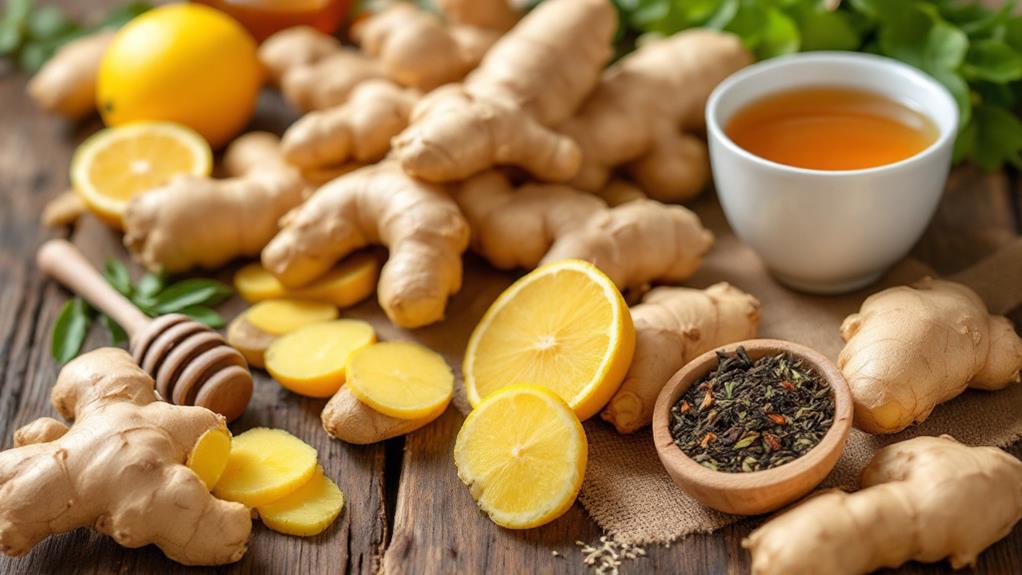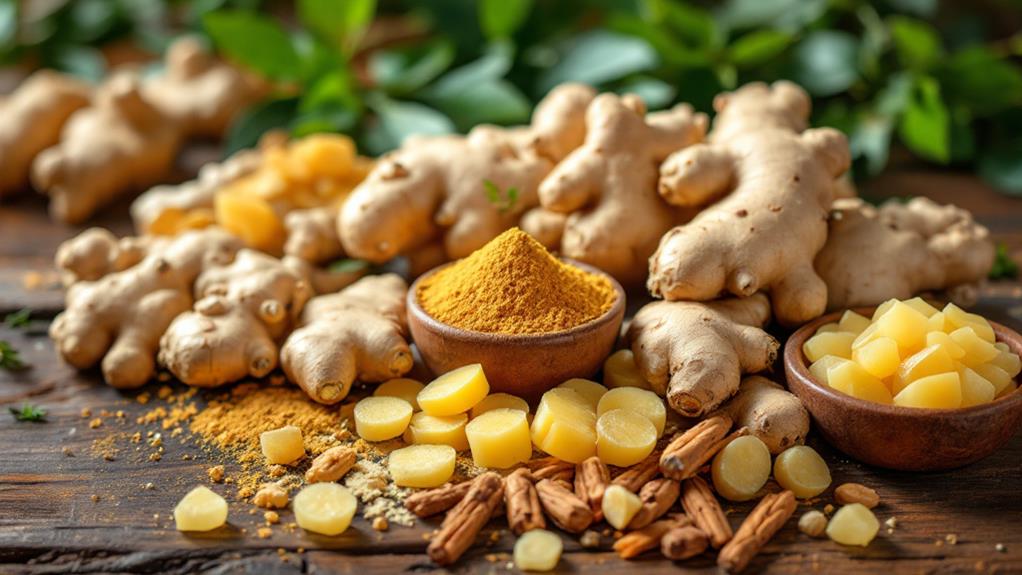Everything You Need to Know About Ginger: Health Benefits and Uses

Ginger is a natural remedy packed with health benefits. It helps reduce inflammation and manage pain from conditions like osteoarthritis and muscle soreness. It's great for digestive health by speeding up gastric emptying and easing symptoms of indigestion. Packed with antioxidants, ginger supports your immune system and may even have cancer-fighting properties. You can use it in different forms, like fresh, dried, or as tea, but be cautious with high doses to avoid side effects. Regardless of your goal to enhance your health or cook with flavor, ginger offers something for everyone. There's more to uncover about this adaptable root.
Health Benefits of Ginger
Ginger offers a multitude of health benefits that you shouldn't ignore. This versatile root is renowned for its anti-inflammatory properties, which can help reduce inflammation and alleviate pain from conditions like osteoarthritis and muscle soreness. If you're dealing with nausea, ginger is your ally. It's particularly effective for pregnant women and those undergoing chemotherapy, as studies confirm its ability to ease queasiness.
But that's not all. Ginger is loaded with antioxidants, which play an essential role in protecting your body from oxidative stress—a contributor to chronic diseases such as cancer and cardiovascular issues. These antioxidants also bolster your immune system, keeping you healthier.
When it comes to digestive health, ginger shines again. It promotes gastric emptying, helping to relieve indigestion, bloating, and gas. This makes meals more comfortable and digestion more efficient.
Furthermore, ginger contains active compounds like gingerol, which have shown potential in inhibiting cancer cell growth—a promising benefit for long-term health. By incorporating ginger into your diet, you're not just adding flavor; you're enhancing your complete well-being. Welcome the health benefits of ginger and let it support your body in multiple ways.
Nutritional Profile
When evaluating the nutritional profile of ginger, you'll find it offers more than just flavor. With only about 4 calories per 2 teaspoons, ginger is remarkably low in calories and fat, making it an excellent supplement to your meals without adding to your calorie count. What makes ginger truly stand out is its rich content of bioactive compounds like gingerol and shogaol. These compounds are powerful antioxidants and have significant anti-inflammatory properties, contributing to ginger's numerous health benefits.
Despite its low vitamin and mineral content, ginger does provide small amounts of vitamin C, calcium, and magnesium. While these contribute minimally to your daily nutritional needs, they still add a slight improvement. One of ginger's remarkable components is dietary fiber, which aids in digestive health by promoting gastrointestinal motility. This fiber content supports a healthy digestive system, adding another layer to ginger's health benefits.
Most significantly, ginger's high antioxidant capacity helps protect your cells against oxidative stress, a major contributor to chronic diseases. Incorporating ginger into your diet can be a strategic move to improve your general health, thanks to its potent anti-inflammatory and antioxidant effects.
Forms and Consumption

Exploring the many forms of ginger can improve both your culinary experience and health regimen. Fresh ginger, with its robust flavor and higher potency, offers significant health benefits and active compounds. It's perfect for those who enjoy a strong taste and wish to enhance antioxidant content in their diet. For convenience and longer shelf life, consider dried ginger. While it may lack the punch of fresh ginger, it still retains some beneficial compounds that contribute to your well-being.
Ginger powder serves as a versatile ingredient in cooking and baking, providing a milder but still delightful flavor. If you're aiming for a more intense taste, fresh ginger might be your go-to choice. Meanwhile, ginger tea, made by steeping fresh or dried ginger in boiling water, offers a soothing beverage rich in health benefits.
Supplements, such as ginger extract and capsules, provide a targeted approach to consumption. They come in varying concentrations, allowing you to tailor your intake to meet specific health needs. This form is particularly beneficial if you're looking for precise dosages of ginger's active compounds without the preparation hassle. Whatever form you choose, ginger's benefits are easily accessible.
Digestive Health
As you consider the assorted forms and consumption methods of ginger, it is vital to acknowledge its impressive impact on digestive health. Ginger plays an important role in speeding up gastric emptying, which can help alleviate chronic indigestion symptoms like abdominal pain and bloating. By promoting the production of saliva and digestive enzymes, ginger guarantees that food is effectively broken down, aiding in smoother digestion.
Moreover, ginger is a powerful natural remedy for relieving nausea. Regardless of you're dealing with morning sickness during pregnancy or nausea from chemotherapy, ginger provides significant relief. It's an excellent choice for those prone to motion sickness or other digestive discomforts. Ginger tea or supplements are often recommended to soothe these symptoms, making them a popular choice for those seeking a gentle solution.
Additionally, ginger helps in reducing bloating and gas. By minimizing fermentation in the intestines, it leads to a more comfortable digestive experience. This traditional remedy has been trusted for centuries to tackle different digestive issues. So, when you reach for that cup of ginger tea or a ginger supplement, you're choosing a time-tested ally for maintaining peak digestive health.
Immune System Support

Ginger stands out as a powerful ally in supporting your immune system. Packed with antioxidants, ginger helps reduce oxidative stress, which is linked to weakened immune function and various health issues, including cancer. By incorporating ginger into your daily routine, you may improve your immune support and strengthen your body's defenses against infections.
Research highlights ginger's impressive germ-fighting properties. Fresh ginger has been shown to inhibit the growth of harmful bacteria like E. coli and shigella, making it a valuable supplement to your immune-boosting arsenal. These properties contribute to its reputation as a natural remedy for combating cold and flu symptoms. For centuries, people have turned to ginger as a traditional remedy to aid in recovery from respiratory infections, showcasing its long-standing health benefits.
Moreover, studies have found that ginger extract may improve antibody response, particularly in nonsmokers, further supporting its potential benefits for immune health. By enhancing your antibody response, ginger helps your body better recognize and fight off invading pathogens. Whether through fresh ginger, ginger tea, or supplements, incorporating this spice into your diet can provide a natural way to strengthen your immune system and help maintain general health.
Pain and Inflammation Relief
Beyond bolstering your immune system, ginger offers significant relief from pain and inflammation. If you've ever experienced muscle soreness after a workout, ginger might be your new best friend. Studies show that regular consumption of ginger can noticeably decrease muscle soreness, improving your recovery and comfort. But its benefits don't stop there. Ginger's anti-inflammatory properties make it a powerful ally against osteoarthritis pain, offering relief comparable to some standard pain relievers for conditions like menstrual pain.
Clinical trials reveal that high dosages of ginger extract, ranging from 1 to 2 grams, effectively relieve pain, showcasing its potential as a natural alternative for pain management. This is particularly beneficial if you're dealing with chronic pain or inflammatory conditions, as ginger may help reduce inflammation markers in your body.
Moreover, topical applications, such as ginger compresses or patches, can provide targeted pain relief and support recovery from physical activities. These applications are especially useful if you're looking to address chronic pain directly at the source. Incorporating ginger into your routine not only improves these health benefits but also offers a natural approach to managing pain and inflammation effectively.
Potential Side Effects

While ginger is generally safe for most people, it's important to be aware of its potential side effects, especially when consumed in high doses. Taking more than 5 grams of ginger can lead to gastrointestinal discomfort, including gas, heartburn, and an upset stomach. If you're someone who takes blood thinners, ginger may increase your bleeding risk. It's vital to exercise caution and perhaps seek advice from health professionals if you're on such medications or have bleeding disorders.
Additionally, some individuals might experience allergic reactions to ginger, which can manifest as a rash or skin irritation. Pregnant women should also be cautious. Before diving into ginger supplements, it's wise to consult a healthcare provider. High doses may affect insulin levels, potentially lowering blood sugar, and that could be concerning during pregnancy.
The long-term effects of regular ginger supplementation aren't well-researched, so keeping an eye on your intake is a good idea. To guarantee you're using ginger safely, especially if you have underlying health conditions or are pregnant, consulting health professionals can provide personalized guidance tailored to your needs.
Ongoing Research
As research continues to unfold, scientists are probing into ginger's promising health benefits, exploring its potential to fight cancer and reduce pain. Ongoing studies suggest ginger's effectiveness against gastrointestinal cancers, showing its ability to inhibit cancer cell growth. If you're dealing with pain and inflammation, especially from conditions like osteoarthritis, ginger might be a natural remedy worth considering. Clinical trials and meta-analyses support ginger's efficacy in reducing these symptoms, offering a glimmer of hope for those seeking alternatives to traditional pain relievers.
Beyond pain relief, ginger's role in metabolic health is under investigation. Researchers are examining how ginger can improve insulin sensitivity and regulate blood sugar, which could be beneficial in managing obesity. This means ginger might help you keep your blood sugar levels steady, a vital factor in combating metabolic disorders.
Moreover, ginger's potential neuroprotective effects are being studied, with animal research indicating it could prevent cognitive decline and support brain health. Its antimicrobial properties are also in the spotlight, with ongoing investigations focusing on its effectiveness against bacterial and fungal strains like E. coli and Candida albicans. Ginger's diverse health benefits continue to inspire scientific exploration.




